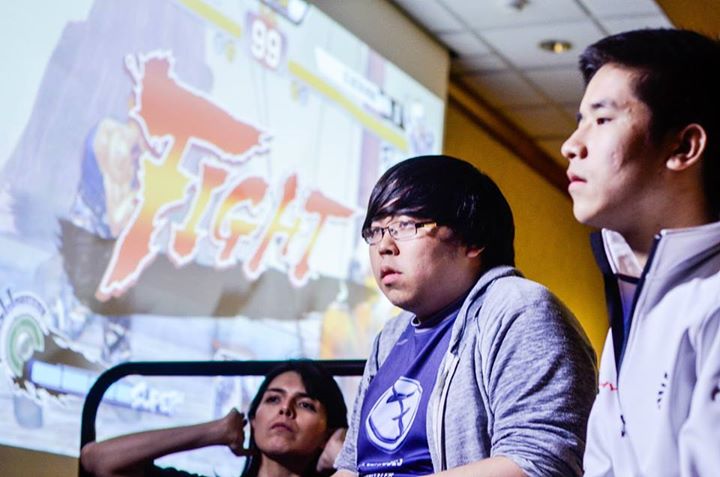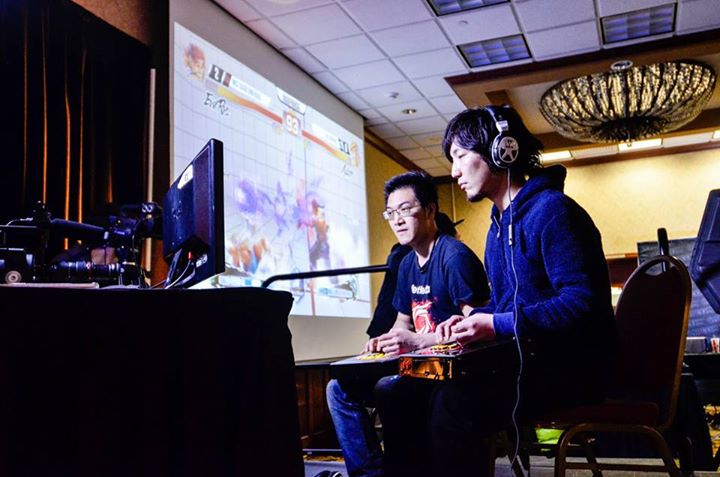Just a small fish in a lake of piranhas
My pool had 16 players, and it was the last one for USF4 pool play. Every pool in the tournament was stacked with international and great local players — a guarantee that no one would emerge from their bracket without battle scars. For me, especially, I was an afterthought. Of the notable players that were in 16, my name might as well be renamed into “bye.” The tournament brackets work similar to NCAA’s March Madness, in that the top-seeded players play the lower-seeded mid-majors.
I was UC Irvine in a pool of Kentucky’s.
The end of a pool day was a vat of emotions. For every fist pound and smile, I saw five players with shrugged shoulders and slow walkers. In every bracket, only two winners emerged from the 16 participants. To be a consistent winner and contender for the main prize, it takes a special player.
I caught up with Team Evil Geniuses’ Justin “JWong” Wong after the first day wrapped up.
“I’m so used to the tournament scene — it’s a walk in the park for me,” Wong told me. “I could be physically tired, but I’ll never be cold. I just go into it — I don’t eat during tournaments, so I stay hungry.”
Wong is a veteran of the fighting game community. A prominent player since 2003, Wong is a winner of countless fighting game tournaments and major events, and it’s no wonder his nerves in regard to the tournament grind were non-existent. He entered his first tournament ever without knowing it was a competition; he tries to enter every single match and tournament with the same mentality.
While Wong was considered the favorite to win in another game during NCR (Ultimate Marvel vs. Capcom 3), his focus was solely on the main game during the weekend, USF4. If a non-international player was to win NCR, Wong would be amongst the favorites to do it.
He just understood what was necessary to win a major event like NCR. Despite being an underdog to the international players, his approach to learning and adapting was positive.
“The competition is better, more players from Asia are traveling,” Wong said. “But that also means more opportunity and information for the players in the USA. It will help in the long run.”
Both PR Rog and JWong believe the long run was the key. The old adage of “it’s a marathon, not a sprint” was the message that both preached. And it’s true. With more international players traveling because of the increased pay and prize pools in the fighting game community, every tournament must be seen as a learning experience regardless of the results.
I stood in line at the crowded Starbucks on day two with my lucky Dr. Dre “The Chronic” T-shirt. It’s been a tournament staple of mine to wear it before my matches began — something about superstition and how the shirt looks on me, but also because I wore it during my first wins as a competitor. As my friend’s conversation floated by my ears, I slapped myself awake in anticipation for my turn to play.
Day two, my 15 minutes
I walked through the crowded tables that hosted four monitors each, the sound of buttons providing the soundtrack for my trance. There were drooping eyes and head nods abound with each passing station; players hoping to get some last-minute practice before their 15 minutes of fame. I camouflaged nicely as I took a seat next to a player affectionately named, Buddy. My fingers gracefully tapped each button as my mind registered my next move, my character moving with my thoughts. I needed to be sharp in as quick of time as possible.
Then 4 p.m. struck, and my pool was in its infancy. A long roll call gathered the players of my bracket together. We waited to see who would be the first victims of the last pool. “Tim, your match is on stream,” Carolyn Dao, the pool organizer, called out to me.
I walked up the steps to the main stage with my friend and first round opponent, Brian “BJ Unchained” Jeon next to me. We were schoolmates, friends, and playing partners for over six years, so this was a match and rivalry that lasted longer than the minutes of our stream match. He was one of the better players in the Northern California region, and I was the afterthought. And the match would play out like it. Not even six minutes in, it was over, and I looked over the prospect of playing every match in the loser’s bracket.
Not the greatest of thoughts.
I took my seat at one of the open stations for my next round and continued sitting until I played three opponents in a row. With each name Dao called out, I took a breath and closed my eyes. My stick plugged in, my feet slightly raised, and my back leaning forward at the monitor. All other noise around the venue were muted. The competitor’s high after a victory is an addicting feel.
Finally, Dao called out my hardest challenge, and a player that I was very familiar with would be my next opponent for the loser’s quarterfinals of my pool. He was one of the best my region had to offer, and there would be no excuses for poor play here. He took his seat and checked his character off the select screen as I did the same.
We entered the stage together and he blitzed me. My character spun in my opponent’s every direction until I blinked and the round was over. A quick breath and the heartbeat steadied — I would not go out in a flash. One series, two, and then three and the first game showed off my character’s victory pose. I was the afterthought, this shouldn’t be happening.
He made the quick adjustment, but I stood in the way again. A long drawn-out second game with exchanging blows ended in his favor, and we stood at the dreaded doors of the final decisive game. The crowd behind was quiet, my friend supporting me said no words as I snapped the rematch option. One wrong decision and he took it a quick fashion, a 2-1 victory for the favorite. No Cinderella stories here. With a smile, he shook my hand and took a deep breath — his tournament would continue where mine ended.
In order to have the correct mindset to winning a major tournament like NCR, players need an effective playstyle, nerves of steel, and a strong mental game. Despite the explosion of new players and aggressive play, it will be solid and defensive styles that reign supreme in the end. As alluded by Kazunoko before, aggression is a trend that works with short sets in tournament play, but longevity isn’t measured by one victory.
“A lot of players do not hold their ground — having great defense in this game is difficult,” Wong said. “This is the hardest game to play defense. But, solid play will win in the end.”
In the end, solid play did finish first as the most successful Street Fighter player of all-time, Team MadCatz’s Daigo Umehara won NCR. The fighting game community will always have its ups-and-downs and storylines, but it’s refreshing to see when consistency wins out. Umehara, who I didn’t talk to, was the sleepy favorite to take the entire tournament and he did so in decisive fashion.
Score one for the fundamentals.
VentureBeat's mission is to be a digital town square for technical decision-makers to gain knowledge about transformative enterprise technology and transact. Learn More


